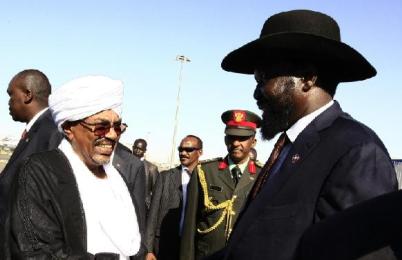Juba and Khartoum agree to deescalate tensions
January 1, 2015 (KHARTOUM) – Sudan and South Sudan have agreed on Thursday to stop hostile media campaigns and advance efforts to implement cooperation agreements signed between the two countries.

Last December, the Sudanese defence minister Abdel Rahim Hussein and the director of National Intelligence and Security Services (NISS) Mohamed Atta claimed that Juba continues to harbor and support Sudanese rebel groups.
Atta’s threats to hunt the rebels inside the South Sudanese territory triggered violent reaction from the South Sudan army (SPLA) spokesperson Col. Philip Aguer who accused Khartoum of declaring war against his country.
Sudan’s president Omer Hassan al-Bashir received on Thursday a message from his South Sudanese counterpart Silva Kiir Mayardit in which he underscored the need to implement the cooperation agreements signed between the two countries.
In September 2012, both Sudan and South Sudan signed a series of cooperation agreements, which covered oil, citizenship rights, security issues, banking, border trade among others.
In March 2013, the two countries signed an implementation matrix for these cooperation agreements.
South Sudan’s foreign Barnaba Marial Benjamin, who delivered the message, said the two presidents expressed keenness to resolve existing differences between the two countries.
Benjamin headed his country’s delegation to participate in the celebrations of the 59th anniversary of Sudan’s independence.
Bashir reiterated Sudan’s keenness to support stability of South Sudan, stressing the need to implement the cooperation agreements for the benefit of the two peoples.
Obied Allah Mohamed, state minister at Sudan’s foreign ministry said Bashir expressed satisfaction with the efforts made to bring together South Sudan’s warring parties, calling upon the two sides to resolve their problems through dialogue.
He added that Bashir urged South Sudan’s rebels to show respect for the legitimate government of president Salva Kiir and called on the two sides to seek to overcome difficult circumstances and challenges facing the fledgling state.
South Sudan’s deadly conflict erupted in December 2013 after clashes broke out between rival factions of the presidential guards in Juba when the president ordered the disarmament of Nuer soldiers in the guards division, triggering the subsequent violence.
According to Mohamed, Bashir stressed the need to focus efforts on implementing the cooperation agreements, saying the move requires “a strong boost from the leadership in both countries”.
Bashir further noted that the ties between the two countries are historic and eternal.
The Sudanese minister added that the meeting discussed several issues and common concerns besides coordination of positions in regional and international issues, pointing to foreign attempts to target African leaders.
He explained that Sudan works through the African Union’s mechanisms of cooperation and joint action to achieve peace in south Sudan and avoid aggregating the problem in the newborn state.
Mohamed said the meeting was marked by intense intimacy, candor and clarity, pointing that Kiir’s message relate to promoting bilateral relations and coordination and joint cooperation in the future.
He said the rest of the issues will be discussed in the meeting of the two presidents which will be held on the sidelines of the African Summit in Addis Ababa.
Mohamed further expressed hope that South Sudan sees stability, saying they will support any move in that direction and will also call for de-escalating hostile media encounters and negative press statements from both sides.
South Sudan’s foreign minister, for his part, said he handed Bashir over a written message from Salva Kiir relating to bilateral ties and issues of common concern besides congratulating the Sudanese people and Sudan’s government of the 59th anniversary of Sudan’s independence.
He pointed that the meeting with Bashir discussed importance of bilateral cooperation, saying “we consider Sudan a brother country”.
Benjamin emphasized the two presidents are keen to work together to achieve peace and stability and resolve all existing differences between the two countries, expressing his delight to be the first foreign minister to meet with Bashir in the new year.
He added that Bashir asked him to assure Kiir that he will seek to resolve all existing problems between the two nations and to implement the cooperation agreements.
The Southern minister further expressed hope that Juba and Khartoum would enjoy peace and stability, adding that the countries need peace now more than ever in order to utilize their potential capabilities.
(ST)
